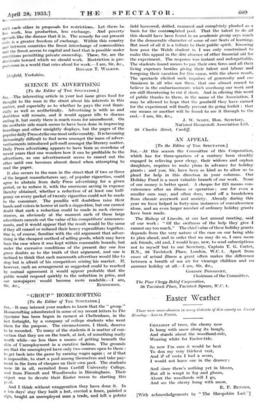SCIENCE IN ADVERTISING [To the Editor of THE SPECTATOR.] SIR,—The
interesting, article in your last issue gives food for thought to the man in the street about his interests in this matter, and especially as to whether he pays the cost finan- cially as well as aesthetically. Advertising is with us and doubtless will remain, and it would appear idle to discuss ending it, but surely there is much room for amendment. On the aesthetic side much seems to haVe been doite in improving hoardings and other unsightly displays, but the pages of the popular daily Press strike one most unfavourably. It is becoming increasingly difficult to find news amongst the mass of adver- vertisements introduced pell-mell amongst the literary matter. Daily Press advertising appears to have been so -overdone of recent years that one wonders how it can be' profitable to the advertise's, as one advertisement seems to cancel out the other until one becomes almost dazed when_ attempting to read the paper.
It also occurs to the man in the streeV-that if two or three of the largest manufacturers say, of popular eigarettes, could agree to abstain from daily Press advertising for a given period, or to reduce it,' with the enormous saving in expense thereby obtiirted, 'whether a reduction of at least one half:. penny on every packet of twenty cigarettes could not be made to the consurner. The pundits will doubtless raise their hands and:Voices in horror at such a inggestion; but one cannot doubt that such a reduction could be made in such circum- stances, as obviously at the moment each of these large advertisers cancels out the value of his competitors' announce- ments, and'it would appear that the result would be the same if they all ceaseckor redueed their heavy expenditure together. One is, of course, familiar with the old argument that adver- tising is the cheapest method of selling goods, which may have been the case when it was kept within reasonable bounds, but under the excessive conditions of the present day one has grave doubts as to. the truth of that argument, and one is inclined to think that each mammoth advertiser would like to stop but is afraid of his competitors seizing-his market. If, however, such an arrangement as suggested could be reached by mutual agreement it would appear probable that the public would respond quickly to the reduction in price, and our newspapers would become more readable.—I am,






































 Previous page
Previous page